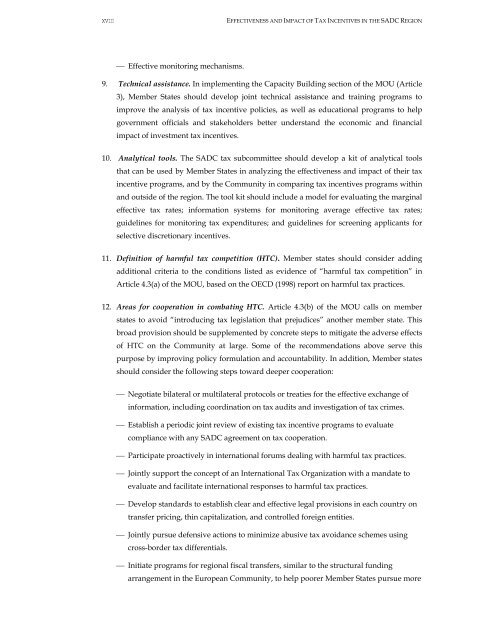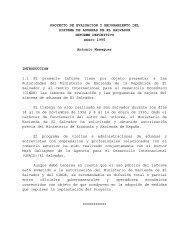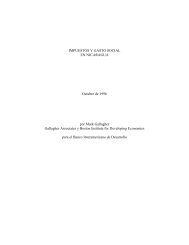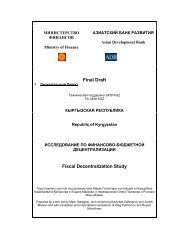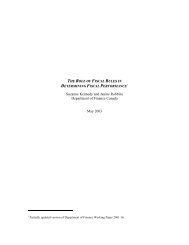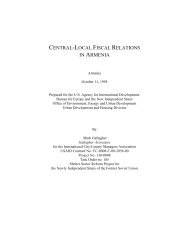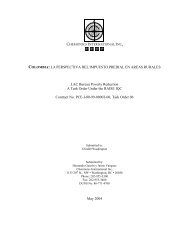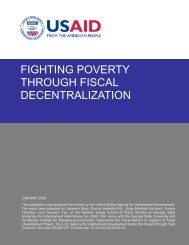Effectiveness and Economic Impact of Tax Incentives in the SADC ...
Effectiveness and Economic Impact of Tax Incentives in the SADC ...
Effectiveness and Economic Impact of Tax Incentives in the SADC ...
Create successful ePaper yourself
Turn your PDF publications into a flip-book with our unique Google optimized e-Paper software.
XVIII EFFECTIVENESS AND IMPACT OF TAX INCENTIVES IN THE <strong>SADC</strong> REGION<br />
⎯ Effective monitor<strong>in</strong>g mechanisms.<br />
9. Technical assistance. In implement<strong>in</strong>g <strong>the</strong> Capacity Build<strong>in</strong>g section <strong>of</strong> <strong>the</strong> MOU (Article<br />
3), Member States should develop jo<strong>in</strong>t technical assistance <strong>and</strong> tra<strong>in</strong><strong>in</strong>g programs to<br />
improve <strong>the</strong> analysis <strong>of</strong> tax <strong>in</strong>centive policies, as well as educational programs to help<br />
government <strong>of</strong>ficials <strong>and</strong> stakeholders better underst<strong>and</strong> <strong>the</strong> economic <strong>and</strong> f<strong>in</strong>ancial<br />
impact <strong>of</strong> <strong>in</strong>vestment tax <strong>in</strong>centives.<br />
10. Analytical tools. The <strong>SADC</strong> tax subcommittee should develop a kit <strong>of</strong> analytical tools<br />
that can be used by Member States <strong>in</strong> analyz<strong>in</strong>g <strong>the</strong> effectiveness <strong>and</strong> impact <strong>of</strong> <strong>the</strong>ir tax<br />
<strong>in</strong>centive programs, <strong>and</strong> by <strong>the</strong> Community <strong>in</strong> compar<strong>in</strong>g tax <strong>in</strong>centives programs with<strong>in</strong><br />
<strong>and</strong> outside <strong>of</strong> <strong>the</strong> region. The tool kit should <strong>in</strong>clude a model for evaluat<strong>in</strong>g <strong>the</strong> marg<strong>in</strong>al<br />
effective tax rates; <strong>in</strong>formation systems for monitor<strong>in</strong>g average effective tax rates;<br />
guidel<strong>in</strong>es for monitor<strong>in</strong>g tax expenditures; <strong>and</strong> guidel<strong>in</strong>es for screen<strong>in</strong>g applicants for<br />
selective discretionary <strong>in</strong>centives.<br />
11. Def<strong>in</strong>ition <strong>of</strong> harmful tax competition (HTC). Member states should consider add<strong>in</strong>g<br />
additional criteria to <strong>the</strong> conditions listed as evidence <strong>of</strong> “harmful tax competition” <strong>in</strong><br />
Article 4.3(a) <strong>of</strong> <strong>the</strong> MOU, based on <strong>the</strong> OECD (1998) report on harmful tax practices.<br />
12. Areas for cooperation <strong>in</strong> combat<strong>in</strong>g HTC. Article 4.3(b) <strong>of</strong> <strong>the</strong> MOU calls on member<br />
states to avoid “<strong>in</strong>troduc<strong>in</strong>g tax legislation that prejudices” ano<strong>the</strong>r member state. This<br />
broad provision should be supplemented by concrete steps to mitigate <strong>the</strong> adverse effects<br />
<strong>of</strong> HTC on <strong>the</strong> Community at large. Some <strong>of</strong> <strong>the</strong> recommendations above serve this<br />
purpose by improv<strong>in</strong>g policy formulation <strong>and</strong> accountability. In addition, Member states<br />
should consider <strong>the</strong> follow<strong>in</strong>g steps toward deeper cooperation:<br />
⎯ Negotiate bilateral or multilateral protocols or treaties for <strong>the</strong> effective exchange <strong>of</strong><br />
<strong>in</strong>formation, <strong>in</strong>clud<strong>in</strong>g coord<strong>in</strong>ation on tax audits <strong>and</strong> <strong>in</strong>vestigation <strong>of</strong> tax crimes.<br />
⎯ Establish a periodic jo<strong>in</strong>t review <strong>of</strong> exist<strong>in</strong>g tax <strong>in</strong>centive programs to evaluate<br />
compliance with any <strong>SADC</strong> agreement on tax cooperation.<br />
⎯ Participate proactively <strong>in</strong> <strong>in</strong>ternational forums deal<strong>in</strong>g with harmful tax practices.<br />
⎯ Jo<strong>in</strong>tly support <strong>the</strong> concept <strong>of</strong> an International <strong>Tax</strong> Organization with a m<strong>and</strong>ate to<br />
evaluate <strong>and</strong> facilitate <strong>in</strong>ternational responses to harmful tax practices.<br />
⎯ Develop st<strong>and</strong>ards to establish clear <strong>and</strong> effective legal provisions <strong>in</strong> each country on<br />
transfer pric<strong>in</strong>g, th<strong>in</strong> capitalization, <strong>and</strong> controlled foreign entities.<br />
⎯ Jo<strong>in</strong>tly pursue defensive actions to m<strong>in</strong>imize abusive tax avoidance schemes us<strong>in</strong>g<br />
cross-border tax differentials.<br />
⎯ Initiate programs for regional fiscal transfers, similar to <strong>the</strong> structural fund<strong>in</strong>g<br />
arrangement <strong>in</strong> <strong>the</strong> European Community, to help poorer Member States pursue more


